|
|
|
Sort Order |
|
|
|
Items / Page
|
|
|
|
|
|
|
| Srl | Item |
| 1 |
ID:
153260
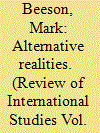

|
|
|
|
|
| Summary/Abstract |
The central argument of this article is that constructivists in particular underestimate or even ignore the importance of the ‘real’ structural inheritance that shapes state (and the political elites that represent them) behaviour. Even though the future is indeterminate, some outcomes are decidedly more likely than others, especially where policymakers believe they inhabit a strategic universe of zero sum outcomes and where self-reliance and assertion remain important. I suggest that ‘critical realism’ offers a way of accounting for the institutional structures that shape international behaviour. The first half of this article makes the case for a critical realist approach. The second half illustrates the possible importance of this claim with reference to the contemporary geopolitics of the Asia-Pacific region.
|
|
|
|
|
|
|
|
|
|
|
|
|
|
|
|
| 2 |
ID:
153261
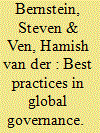

|
|
|
|
|
| Summary/Abstract |
Best practices are increasingly used to govern a range of global issues. Yet, the rise of global governance through best practices has received scant attention in the International Relations literature. How do best practices differ from other modes of governance? How are they constructed? And to what end? We offer a novel conceptualisation of best practices as a unique mode of global governance principally distinguished by basing claims of political authority on existing practices. Belying their apolitical terminology, best practices in global governance are purposively constructed by political actors to steer targeted actors toward desired ends. We illustrate the characteristics of governance through best practices with reference to state and non-state global governance initiatives in a wide range of issue areas, ranging from finance and development to human rights and the environment, and through an in-depth case study of the ISEAL Alliance, a disseminator of best practices for transnational sustainability standard-setters. We find that governance through best practices has both positive and negative consequences. While it offers a pragmatic approach to global governance under conditions of fragmentation and polycentricity, it can also mask underlying power dynamics and political agendas and therefore requires ongoing critical scrutiny.
|
|
|
|
|
|
|
|
|
|
|
|
|
|
|
|
| 3 |
ID:
153254
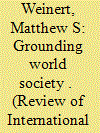

|
|
|
|
|
| Summary/Abstract |
The concept of world society has elicited sharp criticism for being too diffuse and amorphous owing to its synonymy with all transborder social relations, equability with humankind, or conflation with solidarist international society. To overcome these shortcomings, this article reconfigures world society by attaching otherwise unmoored social activity to an understanding of the world as comprised of shared social spaces. This spatialised reading foregrounds constellations of relations that have emerged in conjunction with discrete geographies – natural, economic, cyberspatial, cultural, anthropic – within which humans interact, and demonstrates that the world has become an actionable, political concept generative of activities peculiar to the space itself. A review of English School literature extracts four theses – purposive, plural, spatial, and stewardship – that invite conceptual reconstruction of world society. The article then addresses the discursive construction of cultural heritage as a worldly space populated with distinctive institutions and cognitive and normative commitments, and is followed by reflections on the added value of such an approach and directions for future research.
|
|
|
|
|
|
|
|
|
|
|
|
|
|
|
|
| 4 |
ID:
153255
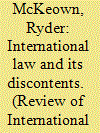

|
|
|
|
|
| Summary/Abstract |
International law is generally considered to be a good thing. With important exceptions, such as Critical Legal Studies, scholarship in both International Relations (IR) and International Law (IL) reinforces this ‘nice law’ assumption and therefore overlooks or underestimates the law’s negative aspects. In contrast, this article assumes the power of international law to examine how international law can have effects that are unintended, unhelpful, or even perverse. In particular, I argue that international law distorts policy- and decision-making processes in liberal democracies by eroding personal responsibility and decreasing accountability; legal expertise and legal virtues crowd out important virtues of statecraft and prudence while shrinking our capacity for sophisticated moral and political thought; and an excessive focus on law can lead to suboptimal foreign policy outcomes. Rather than law being a bad thing per se, I examine the significant strategic and moral limits of international law. This raises the need to lower our expectations of international law, carefully examine the relationship between power and international law, and political responsibility and legal ethics, and more fully embrace our own personal responsibility. The article closes by suggesting a research programme on the dark sides of international law from various theoretical perspectives.
|
|
|
|
|
|
|
|
|
|
|
|
|
|
|
|
| 5 |
ID:
153263
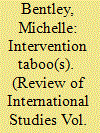

|
|
|
|
|
| Summary/Abstract |
Intervention comprises one of the most contentious issues in International Relations. This controversy results from the way normative understanding is structured around two key, but mutually exclusive, taboos: the moral expectation to respond in cases of humanitarian need and the protection of state sovereignty. In examining this dilemma, this article asks: what happens to the construction of rhetorical strategy, where that strategy seeks to justify intervention (or not), within a binary normative environment? It is argued that actors can only successfully construct a rhetorical case by engaging in, what is termed here, normative invalidation. In a binary situation, actors cannot adhere to both taboos. These taboos are so compelling, however, that actors must necessarily invalidate or neutralise any taboo not adhered to. This is discussed in relation to the Strategic Narratives paradigm and comparative case studies on the presidential rhetoric of Bill Clinton and Barack Obama.
|
|
|
|
|
|
|
|
|
|
|
|
|
|
|
|
| 6 |
ID:
153253
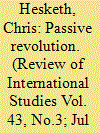

|
|
|
|
|
| Summary/Abstract |
In this article, I argue that Antonio Gramsci’s concept of passive revolution makes a foundational contribution to International Relations (IR), yet has been relatively under appreciated by the broader discipline. Within the Historical Sociology of International Relations, uneven and combined development has recently been postulated as a key trans-historical law that provides a social theory of the ‘international’. Drawing from, but moving beyond these debates, I will argue that passive revolution is a key conditioning factor of capitalist modernity. I will demonstrate how the concept of passive revolution is the element that explains the connection between the universal process of uneven development and the manner in which specific combinations occur within the capitalist era as geopolitical pressures, in tandem with domestic social forces become internalised into geographically specific state forms. It therefore offers a corrective to the frequently aspatial view that is found in much of the literature in IR regarding uneven and combined development. Additionally, passive revolution provides a more politicised understanding of the present as well as an important theoretical lesson in relation to what needs to be done to affect alternative trajectories of development.
|
|
|
|
|
|
|
|
|
|
|
|
|
|
|
|
| 7 |
ID:
153256
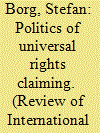

|
|
|
|
|
| Summary/Abstract |
This article contributes to a theoretical understanding of rights claiming as a specific form of political practice. The article develops and defends a post-foundationalist understanding of rights discourse as a way of making a claim to social change through appealing to a universal and illustrates such an understanding with the contestation over women’s rights in post-revolutionary Tunisia. To develop this argument, the article draws on Jacques Rancière’s notion of political subjectification and Ernesto Laclau’s engagement with the relation between the universal and the particular. To examine the relevance of such conceptualisation, the article turns to the struggle over women’s rights in post-revolutionary Tunisia, where secular and sacred understandings of the universal have been invoked frequently through rights discourse. In this context it is shown that claims to the universal give rhetorical force to rights discourse, and instead of depoliticising social relations, which rights discourse is often charged with, such claims are vital for political efficacy. However, whereas Laclau’s position helps us to understand rights as a language of resistance, a more robust defence of the universal is needed to defend rights in terms of emancipatory political change. To pursue this argument, the article turns to Rancière’s defence of axiomatic equality.
|
|
|
|
|
|
|
|
|
|
|
|
|
|
|
|
| 8 |
ID:
153258
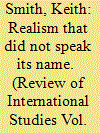

|
|
|
|
|
| Summary/Abstract |
E. H. Carr was one of Europe’s pre-eminent thinkers in the field of international affairs. Yet his contribution to International Relations theory is continually questioned. Realists depict Carr as a quintessential realist; revisionists draw from his wider corpus to qualify his contribution. Although not inaccurate, the revisionist literature is incomplete as it neglects a number of Carr’s diplomatic histories. Refocusing on these, especially the manner in which traces of Ranke’s ‘the primacy of foreign affairs’ tradition is evident, this article points to a more conservative and less critical Carr. Utilising an interpretivist framework, this shift in traditions of thought is explained by the dilemmas Carr faced. Although works of history rather than theory, the article contends that Carr’s diplomatic histories remain relevant, particularly with regard to the embedded criticism of realpolitik they contain. This realisation is made evident through a reading of Carr in parallel with the concept of tragedy.
|
|
|
|
|
|
|
|
|
|
|
|
|
|
|
|
| 9 |
ID:
153259
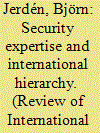

|
|
|
|
|
| Summary/Abstract |
Many states partially relinquish sovereignty in return for physical protection from a more powerful state. Mainstream theory on international hierarchies holds that such decisions are based on rational assessments of the relative qualities of the political order being offered. Such assessments, however, are bound to be contingent, and as such a reflection of the power to shape understandings of reality. Through a study of the remarkably persistent US-led security hierarchy in East Asia, this article puts forward the concept of the ‘epistemic community’ as a general explanation of how such understandings are shaped and, hence, why states accept subordinate positions in international hierarchies. The article conceptualises a transnational and multidisciplinary network of experts on international security – ‘The Asia-Pacific Epistemic Community’ – and demonstrates how it operates to convince East Asian policymakers that the current US-led social order is the best choice for maintaining regional ‘stability’.
|
|
|
|
|
|
|
|
|
|
|
|
|
|
|
|
|
|
|
|
|